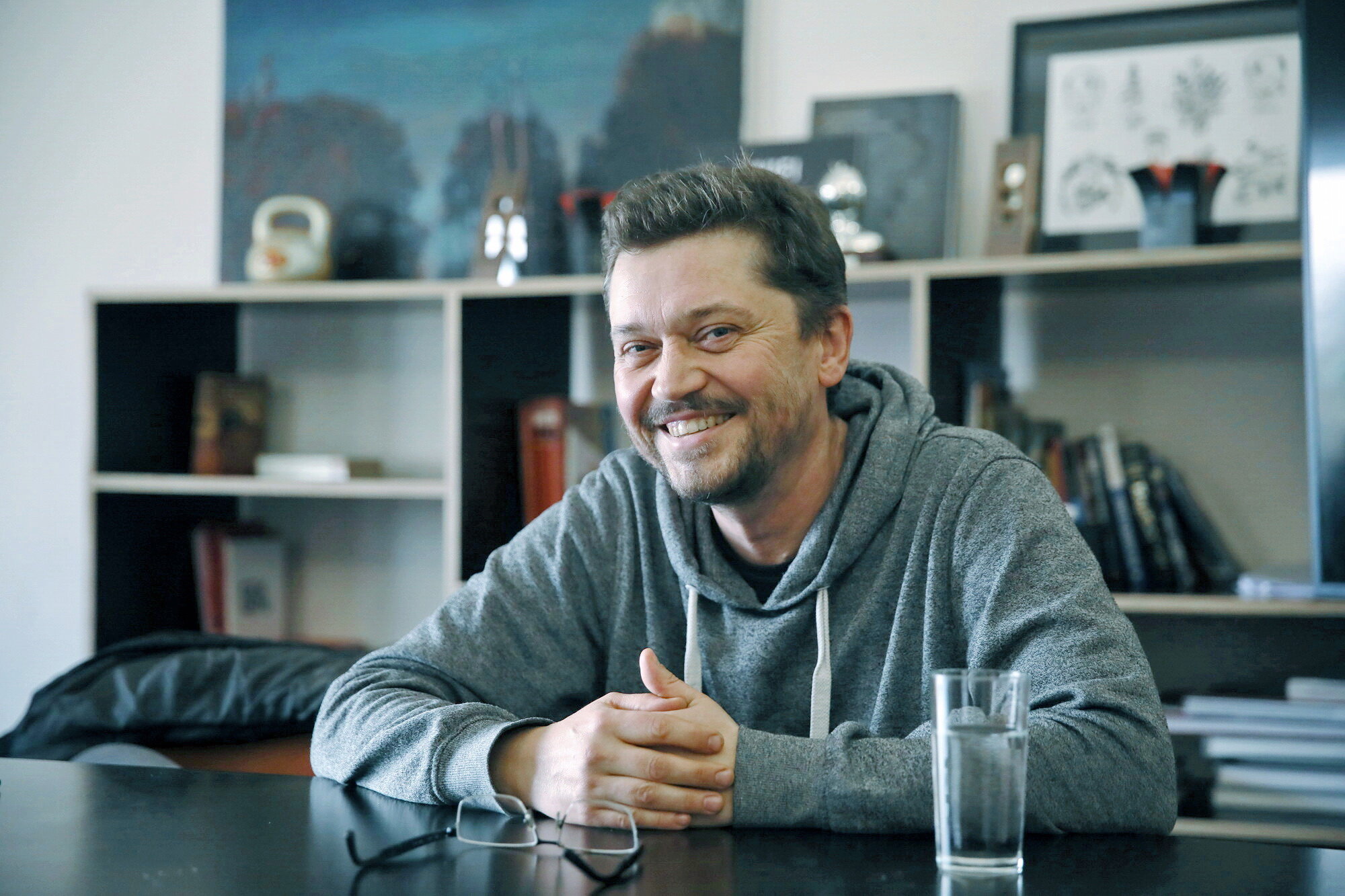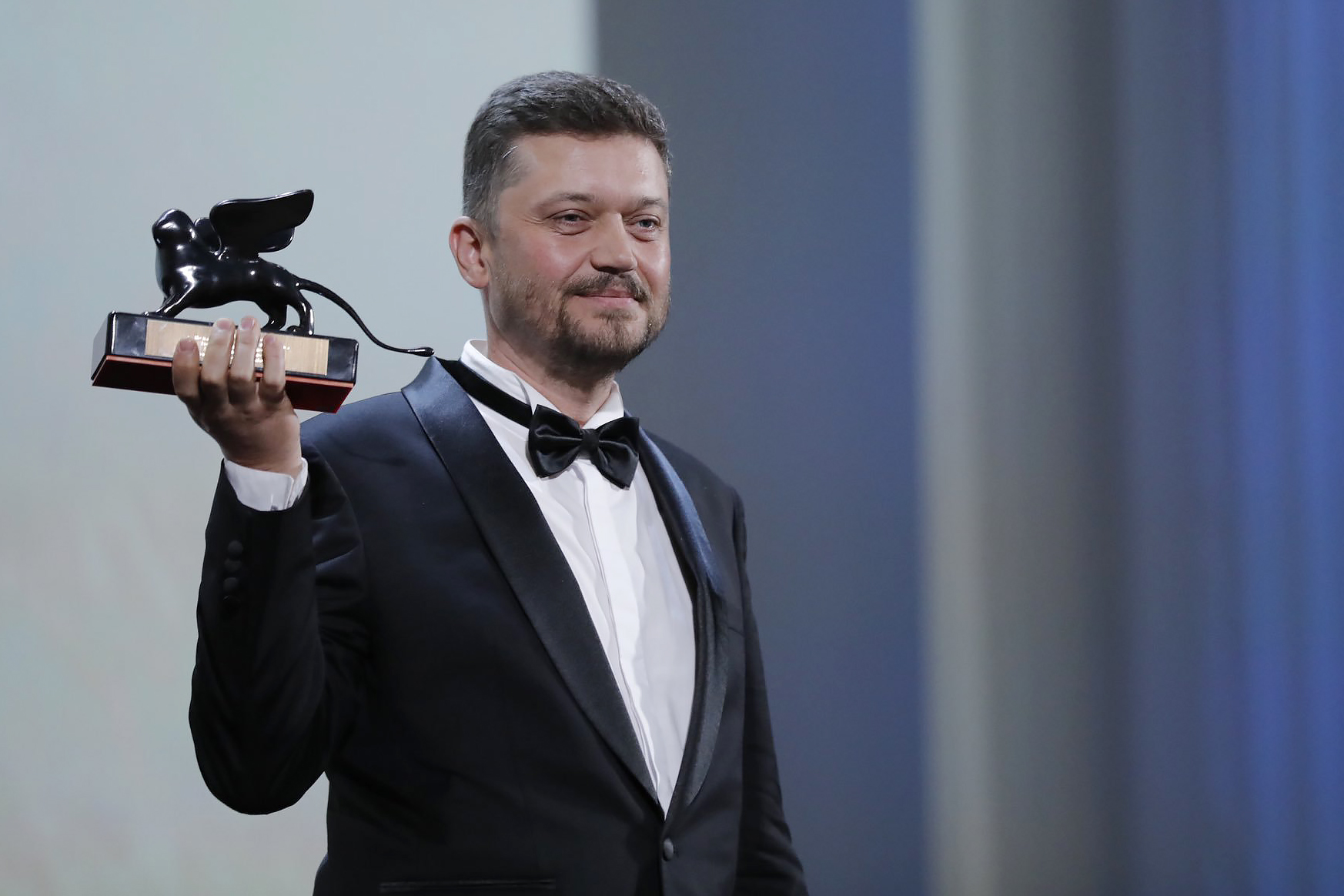Director Valentyn Vasyanovych hit a roadblock when in 2016, he set out to create a film about Russia’s war against Ukraine for the international audience. How do you make a film about this hybrid war that would be understood universally?
There is a lot of history and politics behind it, and disinformation on why the war began and what are the sides of the conflict. For many abroad, it’s still not clear that Russia invaded Ukraine in 2014 aiding its proxy pro-Russian militants.
Most importantly, it’s hard to make a film about a war that is ongoing.
Filmmakers and the international community need time to make sense of the events and come to some agreement about what happened. Some of the world’s best war movies, like “Saving Private Ryan” and “Apocalypse Now” came years after the wars. History books and novels usually come first.
That’s why Vasyanovych faced difficulties: His original screenplay was overloaded with political context and dependent on genre formulas with clear heroes or antagonists.
But then the director came up with the idea that would make his film an internationally acclaimed artistic achievement and a powerful statement against the war in Ukraine at the same time. He simply decided to look at the war from the imaginable future where all guns would have already been fired.
“I understood that I could construct a world where I can do anything,” Vasyanovych told the Kyiv Post. “I was free to assemble stories that have a universal value.”
Vasyanovych wrote, directed, shot and co-produced “Atlantis” that has become one of the most awarded Ukrainian films in history. In 2019, it received Ukraine’s first best film prize at the Venice Film Festival in the second most important Horizons section. Ten more accolades followed, including at the festivals in Tokyo, Montreal, Les Arcs, Seville and Odesa.
But there is still one more award that could make “Atlantis” and its ideas reach the mass audience worldwide, as Ukraine has selected it as its representative at the 93rd U. S. Academy Awards in 2021, best known worldwide as the Oscars.
The trailer for “Antlantis” (Cineuropa)
Signature statics
“Atlantis” is set in 2025, a future in which Ukraine has defeated Russia and returned its territories — the Crimean Peninsula and the eastern region of Donbas. But that’s where the good news ends for Ukraine: in the hostilities, Donbas has been economically and ecologically devastated.
The war also took its toll on the people. The main character Sergiy works at a steel mill in Donbas while suffering from a post-traumatic stress disorder. With his only pal, another decommissioned soldier, Sergiy often drives out of town for target practice. But after the friend dies by suicide and the plant gets shut down, Sergiy has to find a new purpose.
The world is changing drastically around Sergiy, while he remains the front and center figure. Vasyanovych’s fifth directorial full feature, “Atlantis” most resembles his previous film “Black Level.” The 2017 drama follows a middle-aged wedding photographer in a big gloomy city who starts losing everything he cherished while recording other people’s happiness.
In “Atlantis,” Vasyanovych continues to improve his signature cinema language: His films primarily consist of long stationary shots with beautiful symmetrical widescreen compositions. The viewer mostly sees the characters in full height with the background emphasizing their movements.
“I always saturate these statics with hidden attractions,” Vasyanovych says. “And the body language is a powerful tool for conveying the emotional state of the characters.”
Vasyanovych first employed this technique as a cinematographer in “The Tribe,” the 2014 sensation directed by another Ukrainian filmmaker Myroslav Slaboshpytskyi. Although Vasyanovych’s visual style defined the award-winning drama, all the laurels went to Slaboshpytskyi.
But the beginnings of Vasyanovych cinema language lay in his documentary work. The long stationary takes that observe his characters came to him naturally in “Crepuscule,” a 2014 documentary about the relationships of an elderly woman and her visually impaired son in rural Ukraine.
“I’m enchanted when real life, real cinema starts to unfold in your camera when you’re filming a documentary,” the director says. “Now I’m happy to have an opportunity to construct such scenes in feature films.”

Valentyn Vasyanovych, writer, director, cinematographer and co-producer of “Atlantis” speaks with the Kyiv Post on Oct. 26, 2020 in Kyiv. “Atlantis” is one of Ukraine’s most-awarded films and a powerful statement against Russia’s war in the county. (Volodymyr Petrov)
Documentary actors
But what makes Vasyanovych’s new feature film most similar to documentaries are what he calls “documentary actors.” In “Atlantis,” the main hero and people he meets were mostly played by unprofessional actors, who had an experience similar to that of their characters.
After Sergiy is fired from the steel mill, he finds a job delivering water to people in the polluted Donbas wasteland. That’s when he meets sappers, who clear the mines and other devastation left by the war, and volunteers who locate, identify and properly bury war casualties. All these are played by real-life sappers, military volunteers, medics and even a real-life coroner.
Vasyanovych says he prefers such actors because they have a “unique emotional experience imprinted on their faces.” Andriy Rymaruk, who plays the main character Sergiy, had combat experience in Donbas and still travels there as a volunteer to bring equipment to Ukrainian soldiers with the Come Back Alive foundation.
“I saw everything in him,” Vasyanovych says. “He was able to perfectly convey the pain and confusion of a person traumatized by war.”
But working with Vasyanovych isn’t easy. After he finds a location, he likes to hold dozens of rehearsals with actors to improve the screenplay and their lines. Only then he starts shooting, which may take up to 45 long takes until everything is the way he wants.
The crew even joked that while trying to cure the actors of PTSD caused by war, they gave them another PTSD caused by cinema.
“It was an unusual rehabilitation: to look into the future after the war and get incredible experience and skills,” says Rymaruk, who continues his acting career after “Atlantis” and will play in Vasyanovych’s next film.
For Vasyanovych, Ukrainian servicepersons and volunteers are also the most important domestic audience of “Atlantis.” Rymaruk says that his friends and colleagues from the military have so far complimented the film for being “truthful and realistic.”
The actor believes the film brings value for the local audience because it raises critical questions the society will have to answer at some point: “How will we deal with the consequences of war? And are we ready to work with the people on the temporarily occupied territories?”
By the start of 2018, Vasynovych thought that he finished filming “Atlantis.” It was a cold and distant movie about men in combat boots and big trucks dealing with their traumas, he says. But the story didn’t feel right without one crucial element.
“I understood that the story didn’t work without love,” Vasyanovych says. “So I had to film five or six more new scenes.”
Among the volunteers in the Donbas wasteland, Sergiy meets Katya, a paramedic who helps identify war casualties, played by real-life medic Liudmyla Bileka. By the end of the film, Sergiy and Katya become intimate in a shockingly beautiful or beautifully shocking scene that combines love and death.
“Love overcomes death,” Vasyanovych says. “It’s a very important message of the film.”

Ukrainian director Valentyn Vasyanovych receives the Venice Horizons Award, the best film prize in the second most important Horizons section of the Venice Film Festival in Venice, Italy on Sept. 7, 2019. (Venice International Film Festival\Twitter)
Oscars and distribution
This universal message of “Atlantis” appeals to international audiences while reminding about Russia’s ongoing war in Ukraine and warning about its consequences. And the movie’s artistic value can also interest the U.S. film academy that selects the Oscars winners, Vasyanovych says.
“Atlantis” is the second film by Vasyanovych that has been selected to represent Ukraine at the Oscars by the Ukrainian Oscar Committee. “Black Level” was chosen in 2017 but didn’t make it to the nominees’ list. Vasyanovych says that the chances are much higher this time.
“This time, we have awards at the A-Class film festivals, we have an American distributor and foreign press publications by the likes of Variety and Hollywood Reporter,” Vasyanovych says.
The Oscars chances also very much depend on the film’s promotion in the U.S., especially among the academy members. Volodymyr Yatsenko, the film’s co-producer in charge of promotion, says that they are negotiating with the Divergent PR company that publicized “Parasite,” the 2020 Oscars best picture winner. Yatsenko hopes Ukraine’s Council on State Support of Cinematography will help fund such a promotion.
But the coronavirus pandemic brings uncertainty to the distribution of new releases in the U.S. and anywhere else. So far, “Atlantis” had a wide release only in the Netherlands and Ukraine. Distribution rights were also purchased in Norway, Switzerland, Belgium, Canada and the U.S., Yatsenko says.
Ukrainian wide theater release started on Nov. 5. But Yatsenko doesn’t expect great ticket sales because of the pandemic and because art-house films like “Atlantis” are not popular among Ukrainians.
“But it’s the most important art-house film in the history of independence. So our task here is to make sure that as many Ukrainian viewers as possible can see this film,” Yatsenko says.
To do that, the producers will make “Atlantis” available after the theatrical run on Sweet.tv, one of Ukraine’s video streaming platforms. For viewers abroad, the film will be available on HBO Eastern Europe.
Meanwhile, Vasyanovych is working on his next film called “Vidblysk” (“Reflection”). And the theme of war in Ukraine will be present there as well. Why? “Because the war isn’t over,” Vasyanovych says.
“Atlantis” is currently in cinemas across Ukraine, screened with English subtitles at Kyiv’s Zhovten cinema (26 Kostiantynivska St.) Nov. 12–13, Nov. 16–18. Hr 75–125 and Kino42 (11 Kostiantynivska St.) Nov. 13, Nov. 16–18. Hr 120.
This story was produced within the Intensive Course for Film Critics organized by the Contemporary Ukrainian Cinema NGO. The content is independent of the organizers.



